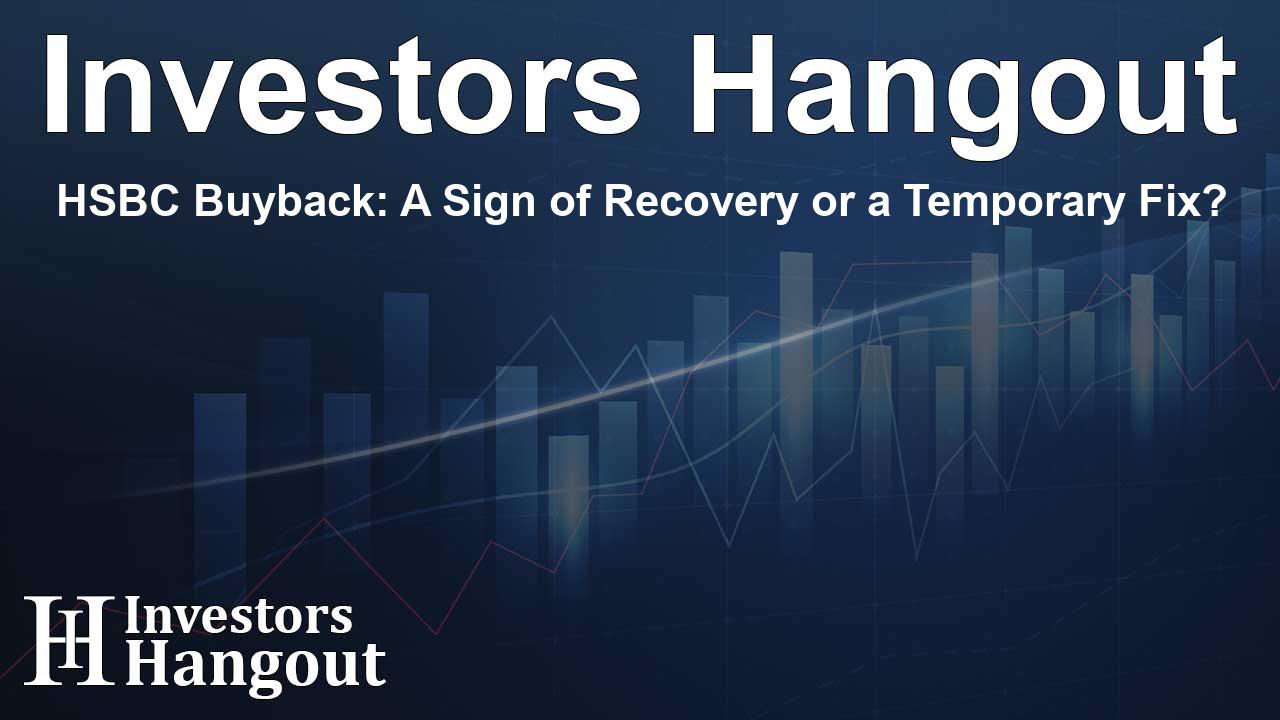HSBC Buyback: A Sign of Recovery or a Temporary Fix?

HSBC's Unexpected $3 Billion Share Buyback
HSBC (NYSE: HSBC) made waves in the financial world with the announcement of a $3 billion share buyback. This comes in the wake of a disappointing second-quarter net profit which plummeted by 29%, amounting to $4.58 billion, trailing behind analyst predictions of $5.29 billion. The decline was attributed to a significant $2.1 billion impairment connected to the bank’s stake in China’s Bank of Communications, despite an increase in net interest and fee incomes.
Understanding the Buyback's Timing
The timing of this major buyback is particularly perplexing. Is it a genuine show of confidence in the company’s future, or a strategic distraction from recent earnings declines? Investors find themselves debating the motivations behind this move: whether it reflects a robust strategy or indicates deeper, unresolved structural issues within the bank.
Restructuring Under New Leadership
With Georges Elhedery stepping into the role of CEO, HSBC has seen aggressive restructuring efforts aimed at reshaping its operations. Key moves include the merger of commercial and investment banking sectors and a 30% reduction in the executive committee. This pivot emphasizes strengthening its core areas: retail banking in the U.K. and Hong Kong, along with corporate services designed for cross-border exchanges and managing affluent clients.
Shifting Focus Away from Western Markets
Earlier this year, HSBC made the decision to withdraw from advisory roles in M&A and IPOs within the U.S. and European markets. While this signifies a retreat from its previous global aspirations, it showcases a disciplined approach towards focusing on sectors and regions where it has traditionally excelled.
Investor Reactions and Market Trends
The share prices for HSBC have responded favorably, demonstrating a 33% rise in Hong Kong throughout the year. This growth is driven by renewed investor confidence in the bank's restructured model and a stabilizing environment regarding U.S.-China trade dynamics. However, caution lingers due to ongoing geopolitical tensions, regulatory concerns in China, and potential economic challenges that could affect the bank's future.
Buyback's Limitations
Even though the $3 billion buyback may foster short-term gains and uplift investor sentiments, it does not resolve the bank’s more profound, systemic challenges. A capital return of this size cannot address volatility in specific regions or alter the overarching economic framework. The effective execution of HSBC's core strategy will ultimately be the critical factor that determines lasting success.
Conclusion: Evaluating HSBC's Path Forward
HSBC is currently navigating a pivotal moment in its history. The bold share buyback and strategic realignment under new leadership bring a resurgence of enthusiasm among investors. Nonetheless, for the bank to achieve genuine transformation, it must reconcile its financial fundamentals with these ambitious moves in an increasingly volatile banking landscape.
Frequently Asked Questions
What prompted HSBC's $3 billion buyback announcement?
The buyback was announced despite a significant drop in profits, leading to speculation about its true purpose—whether it is to boost confidence or distract from issues.
How has the market reacted to HSBC's buyback?
Shares of HSBC saw a 33% increase in Hong Kong year-to-date, reflecting positive sentiment from investors regarding the bank's restructuring and improving conditions.
What are the risks still faced by HSBC?
Despite the positive market response, HSBC faces risks such as geopolitical tensions, regulation issues in China, and macroeconomic challenges that could impact its future performance.
Is the buyback a long-term solution for HSBC?
No, the buyback may enhance short-term valuation but does not address deeper structural issues within the bank that need to be resolved for long-term success.
What strategic changes has the new CEO implemented?
New CEO Georges Elhedery has initiated a major restructuring, merging operations and refocusing on core growth areas, including retail banking and high-net-worth client management.
About The Author
Contact Dominic Sanders privately here. Or send an email with ATTN: Dominic Sanders as the subject to contact@investorshangout.com.
About Investors Hangout
Investors Hangout is a leading online stock forum for financial discussion and learning, offering a wide range of free tools and resources. It draws in traders of all levels, who exchange market knowledge, investigate trading tactics, and keep an eye on industry developments in real time. Featuring financial articles, stock message boards, quotes, charts, company profiles, and live news updates. Through cooperative learning and a wealth of informational resources, it helps users from novices creating their first portfolios to experts honing their techniques. Join Investors Hangout today: https://investorshangout.com/
The content of this article is based on factual, publicly available information and does not represent legal, financial, or investment advice. Investors Hangout does not offer financial advice, and the author is not a licensed financial advisor. Consult a qualified advisor before making any financial or investment decisions based on this article. This article should not be considered advice to purchase, sell, or hold any securities or other investments. If any of the material provided here is inaccurate, please contact us for corrections.
